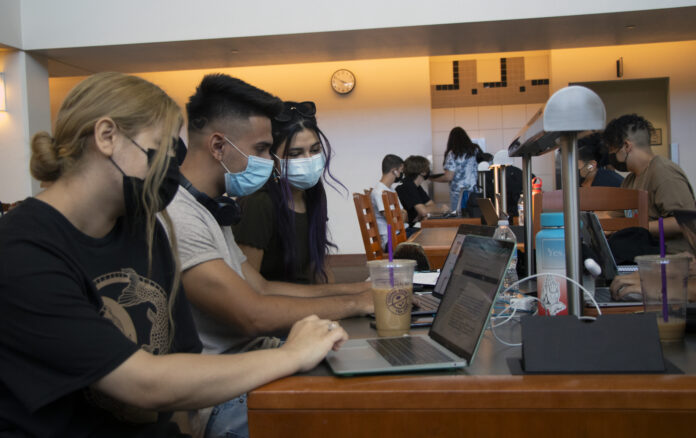When the pandemic caught students, faculty and administration off guard in March 2020, the UNLV community scrambled to navigate these new, unprecedented times together. In the spirit of compassion, the unexpected trials of college life during a global public health crisis prompted a new, temporary Satisfactory/Unsatisfactory (S/U) grading option authorized by NSHE Chancellor Thom Reilly.
The temporary S/U grading policy allows undergraduate students to change a grade of “C” or better to “S,” removing the grade from their grade-point-balance calculation. Students have a window of time after the semester ends to opt-in to this grading option, for one or all courses, after final course grades are posted. This option is available for most, but not all, courses and some graduate students may also be able to opt-in.
While the COVID-19 pandemic continues to linger, rise and dip, this reality has become exceedingly more normal. As the sixth semester of the pandemic begins, is this grading option still necessary and beneficial to students? Can we really consider it temporary?
Though this grading option is well-intended in nature, it is possible for some to misuse this system since there are no screening processes in place. Students essentially have the option to erase any grade that they are unsatisfied with for any given class, so long as it does not disrupt fulfilling their degree requirements or future career plans.
Students should not take the S/U option lightly, however. When reviewing the S/U policies online, the fine print warnings are fairly extensive. There can be a slew of unforeseen consequences for changing a course grade to S/U, including but not limited to, not fulfilling a degree requirement, coursework not being accepted for future graduate school admissions or unpreparedness of students to advance to upper-division courses.
A local UNLV student shared her regret for opting-in to the S/U grading option early in the pandemic. She now has to retake the courses she changed to S/U because the S/U grade is not accepted by the professional schools she will be applying to, effectively delaying her graduation.
After a year and a half of offering this new grading option, the S/U policy page does a thorough job at detailing the potential impacts of opting in and frequently recommends speaking with an advisor before requesting a grade change. However, student awareness about the possible consequences of S/U grading is still very low.
Ashley Sylvester, director of the pre-professional advising center, is focusing her efforts this year on increasing student awareness about the extra layer of complexity of the grading option. Her team at the Pre-Professional Advising Center encourages students to research the specific policies of the schools they are applying to and to center in on the trajectory of their entire academic history when considering switching to S/U grading.
“Severe implications due to the pandemic are absolutely understandable,” Ashley says. “We work with students to understand that [opting into S/U one time] does not mean they are not getting into medical school.”
As a result, all pre-professional applications include an optional COVID-19 section that states that any unforeseen or outside circumstances need explanation so the admissions committee has a clear understanding of why the S/U grading was used, omitting confusion.
By now, most students have had the chance to adjust to this alternate, remote reality. However, the risk of transmission in Clark County remains very high, with only 43.7 percent of the population fully vaccinated (as of Aug. 24). Illness in the family, loss of income, instability in the home, high risk of exposure and a threat to one’s mental well-being are all still a reality for many in the Las Vegas area. These are all key considerations in continuing to offer students the S/U grading option.
With hospitalizations in Nevada progressively rising in the past six weeks, the need for compassionate flexibility is still strong in the Las Vegas community. However, it may be time to update the S/U policy to ensure that students are appropriately utilizing the S/U option and recognize the potential impacts a grade change may have on their degree progress.

